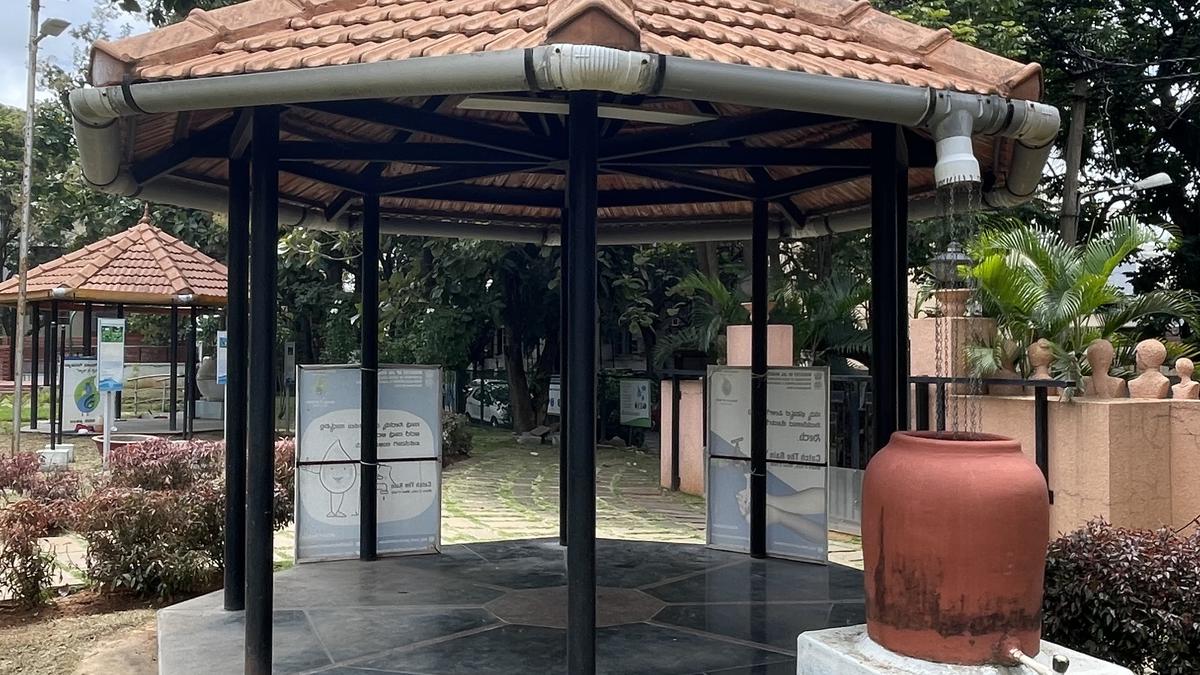
About 90% households in Bengaluru let rainwater go down the drain Premium
The Hindu
Bengaluru residents are not harvesting rainwater to potential, with only 10% of 19 lakh housing properties having RWH systems. The BWSSB is now educating property owners to reuse/recharge rainwater.
Monsoon is here and expected to gain momentum in the coming days, but are households in Bengaluru letting it all go down the drain or making the effort to harvest rainwater?
According to data by the Bangalore Water Supply and Sewerage Boards (BWSSB), Bengalurians are not harvesting water to their potential, with many properties yet to set up rainwater harvesting (RWH) systems. According to data provided by the Bruhat Bengaluru Mahanagara Palike (BBMP), as of July 2019, Bengaluru has 19 lakh housing properties; however, so far, only 1,88,433 properties (about 10%) have RWH systems, and the BWSSB has collected a fine of ₹1.96 crore from violators who are yet to install the systems on their properties.
It was way back in 2009 that the BWSSB made it mandatory for new constructions on a site measuring 30x40 feet to either recharge rainwater or store it in a sump or tank. In 2021, the BWSSB passed the Bengaluru Water Supply and Sewerage (Amendment) Act, 2021, and made it mandatory for all constructions on sites measuring 60x40 feet, including those built prior to 2009, to have RWH systems in place. However, to this day, many homes and properties in Bengaluru still lack RWH systems.
“We have popularised RWH in many areas across the city and have made it mandatory for new properties bigger than 30x40 feet to install rainwater harvesting systems. We are educating property owners to reuse rainwater and recharge the groundwater,” says N. Jayaram, Chairman, BWSSB.
Residents who have been harvesting rainwater are a happy lot. Speaking to The Hindu, Sushma Rao, a resident of Uttarahalli, says, “We have had the RWH system ever since our house was built and have never been short on water supply though many parts of the area have faced a shortage of water for many years now. However, harvesting rainwater is not the only form of sustainability; at our home, we reuse water and waste from the kitchen to water our plants and make our own compost.”
Umashankar S.D., a resident of J.P. Nagar 8th Phase, says neighbours who do not have RWH systems are suffering from a shortage of water supply. “Since it is mandatory to have RWH systems at properties when we bought this house, we made sure the property came with the unit. Cauvery water is supplied just thrice a week in our area, which again is not guaranteed. Since we moved here, we have never faced a shortage of water as we have an RWH well that is 20 ft deep. It stores enough water for many months. However, we have heard complaints of shortage of water from our neighbouring residences as most of them do not have RWH systems, and their borewells are also drying up. Despite having borewells, they are dependent on water tankers.”
Activists believe that the civil agency should do more to ensure RWH units are installed in all households. Sandeep Anirudhan, Convenor, Citizens’ Agenda for Bengaluru and Coalition for Water Security, says most RWH units are not operational, and the BWSSB must have an integrated metering for every property.

After Leader of the Opposition in the Assembly R. Ashok’s prediction on Saturday that Chief Minister Siddaramaiah will step down in November 2025 triggered intense political discussions in the State, Home Minister G. Parameshwara on Sunday said Mr. Siddaramaiah will continue for the full five-year term.

 Run 3 Space | Play Space Running Game
Run 3 Space | Play Space Running Game
 Traffic Jam 3D | Online Racing Game
Traffic Jam 3D | Online Racing Game
 Duck Hunt | Play Old Classic Game
Duck Hunt | Play Old Classic Game
















